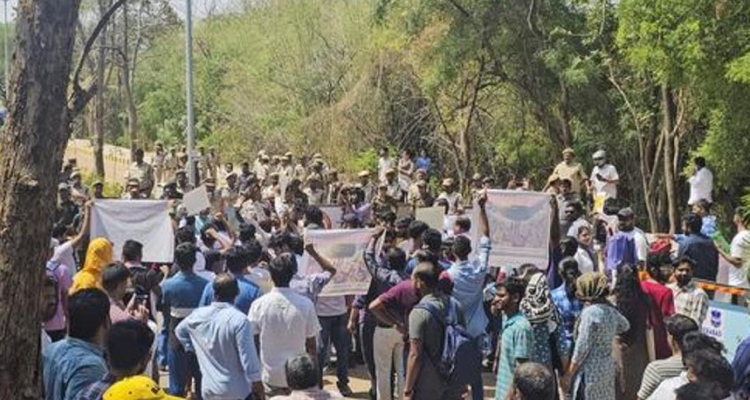
The Supreme Court of India on Thursday took judicial note of the ongoing deforestation affecting 400 acres of land in Kancha Gachibowli, near the Hyderabad Central University campus.
The court directed the Telangana government to immediately stop all tree-felling and excavation activities at the site.
SC’s Intervention Amid Growing Concerns
A bench comprising Justices Bhushan R Gavai and AG Masih issued the directive after reviewing media reports about large-scale tree felling in the area, which were allegedly carried out over the long weekend.
The bench observed, “The news items show that the authorities, taking advantage of long holidays over the weekend, have rushed through in felling the trees. Additionally, the forest is said to be home to eight species of scheduled animals.”
The court’s intervention comes following widespread media coverage and public outcry over the rapid deforestation, which has raised environmental concerns about the destruction of critical habitats.
On-Site Inspection Ordered
The court also directed the Registrar (Judicial) of the Telangana High Court to conduct an on-site inspection of the area and submit an interim status report by 3:30 pm on the same day.
Furthermore, the court ordered the Chief Secretary of Telangana to ensure that no further tree felling takes place in the Kancha Gachibowli forest area until the Supreme Court issues further orders. The matter has been scheduled for a detailed hearing at 3:45 pm.
Telangana High Court Also Seized of the Matter.
During the proceedings, Senior Counsel Abhishek Manu Singhvi, representing the Telangana government, informed the bench that the Telangana High Court is already handling the case and is scheduled to hear it at 2:15 pm on the same day.
However, the Supreme Court clarified that the high court’s proceedings are not stayed, and both courts will continue to address the issue simultaneously.
Environmental Concerns
The Telangana High Court had recently issued an interim stay on excavation and tree-felling activities in the 400-acre area near the HCU campus. The order came after petitions were filed by environmental groups and activists, including the Vata Foundation ENPO and retired scientist Kalapala Babu Rao.
The petitions challenge Government Order (GO) 54, which facilitates the transfer of the land to the Telangana State Industrial Infrastructure Corporation (TSIIC) for IT infrastructure development. Petitioners argue that the land should be designated as a protected ecological zone due to its rich biodiversity, including species like spotted deer, wild boars, star tortoises, and Indian rock pythons.
They also highlighted the presence of two lakes and unique rock formations, asserting that the area qualifies as a reserved forest, regardless of government records.
Government’s Defense & Public Protests
Defending the project, Advocate General A Sudarshan Reddy argued that the land has historically been designated for commercial purposes, tracing its allocation back to the Nizam era and its transfer to IMG Bharatha in 2003. The state government claims the development aligns with its broader goals of infrastructure expansion.
The controversy has sparked significant public protests, with students and environmental activists staging sit-ins at the University of Hyderabad. Political student organizations like the Bharatiya Janata Yuva Morcha (BJYM), Akhil Bharatiya Vidyarthi Parishad (ABVP), and various Left-wing groups have also joined the agitation.
On April 2, some protestors attempted to enter the university campus but were stopped by the police, further escalating tensions.
National Significance Of The Case
With the Supreme Court now involved, the case has gained national attention, highlighting the complex intersection of environmental protection, legal rights, and developmental policies in Telangana.
The high court has scheduled another hearing for 2:15 pm on Thursday to review compliance with its interim order, while the Supreme Court’s verdict is awaited.
Read More: Supreme Court, Delhi High Court, States High Court, International




